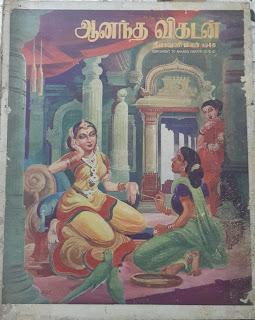Mylapore in 1820s
A view of Kapaliswar Temple and Tank in late 1940s with people happily bathing and washing clothes in the tank.
A description of Mylapore in the year 1820 by Elijah Hoole a Wesleyn missionary in his book on Madras Mysore and South India.
" The original Hindu town of Meilapoor stands at a short distance from the beach and was never included within the Portuguese Fort. It has a large ancient temple of considerable repute; adjoining it is a deep stone built tank filling a very large quadrangle where the natives bathe and from which they supply themselves water. The annual festival of the temple is attended by tens of thousands of worshippers and is celebrated with barbaric splendour and great expense. There is no place within the same distance of Madras where the traveller may see such as assemblage of Yogis, Sanyasins, Tabasins, Pandarams all the varieties of heathen priests and devotees each making an exhibition of his peculiar mode of dress, worship and penance as in Meilapoor on this occasion. The Brahmans and other inhabitants of Meilapoor are less accessible to the exertion of Christian missionary than the inhabitants of the interior generally. On the north side of Meilapoor there are many Mahommedan inhabitants".
A description of Mylapore in the year 1820 by Elijah Hoole a Wesleyn missionary in his book on Madras Mysore and South India.
" The original Hindu town of Meilapoor stands at a short distance from the beach and was never included within the Portuguese Fort. It has a large ancient temple of considerable repute; adjoining it is a deep stone built tank filling a very large quadrangle where the natives bathe and from which they supply themselves water. The annual festival of the temple is attended by tens of thousands of worshippers and is celebrated with barbaric splendour and great expense. There is no place within the same distance of Madras where the traveller may see such as assemblage of Yogis, Sanyasins, Tabasins, Pandarams all the varieties of heathen priests and devotees each making an exhibition of his peculiar mode of dress, worship and penance as in Meilapoor on this occasion. The Brahmans and other inhabitants of Meilapoor are less accessible to the exertion of Christian missionary than the inhabitants of the interior generally. On the north side of Meilapoor there are many Mahommedan inhabitants".




Comments